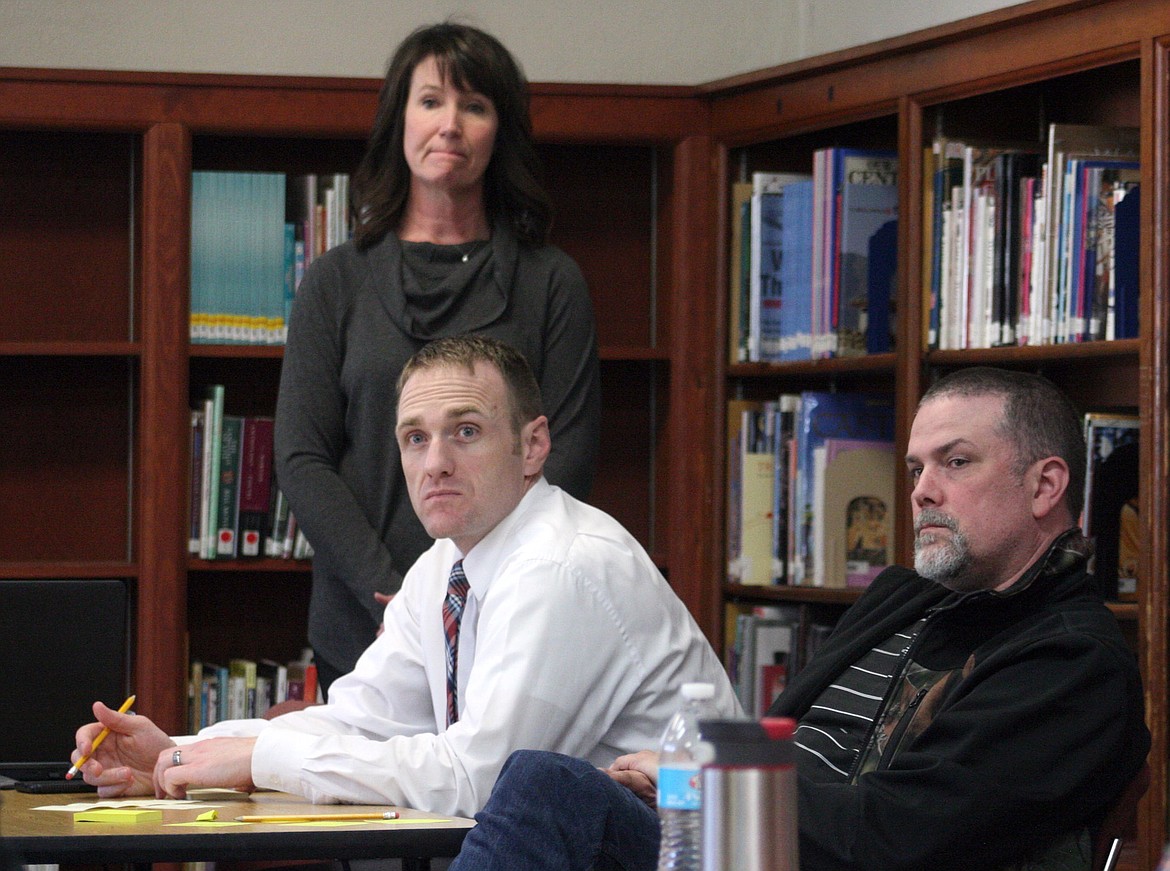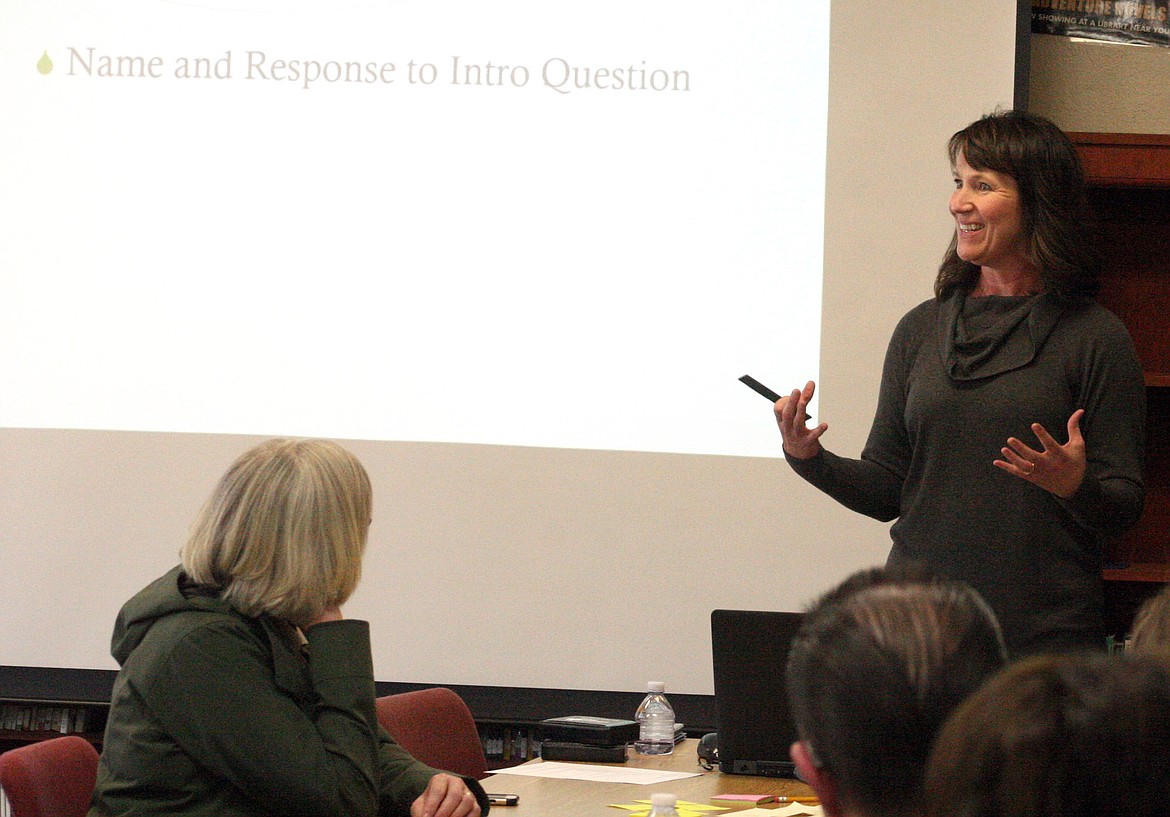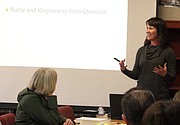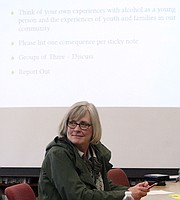Troy meeting covers drugs, alcohol
Representatives from local schools, churches, law enforcement and the health department, along with concerned citizens, attended a last-minute meeting in Troy Tuesday night to address drug use in Lincoln County.
The meeting was called last week by Unite for Youth’s Maggie Anderson, who wanted to provide a public forum in the wake of some recent high-profile incidents, including deaths, that resulted from drug or alcohol abuse. Latecomers who hoped to sneak into the High School library unnoticed found it was standing room only as the room filled with about 50 people.
In her opening remarks, Anderson paused to look around the room. Her voice faltered and she choked up as she began to speak.
“Drug use is a political topic,” she acknowledged. “Some people say, what can I do? While some people say, stay out of my business. It’s so wonderful that you are all here tonight because it shows we all want to do something.”
Anderson asked everyone present to briefly introduce themselves, but it soon became clear that people had more to say on the topic at hand than a few minutes allowed.
Wayne Moffitt, an ambulance attendant in Troy, said “Ninety percent of the accidents I attend have something to do with drugs or alcohol.”
As Anderson moved around the crowded room, more questions than answers were presented to the group. A citizen asked, “When I’m walking down the street and I see someone who’s strung out, what do I do?”
Dave Cooper, co-owner of The Halfway House bar on Highway 56, introduced himself as “a widower.” His wife died in March in a head-on collision with a man who was driving under the influence of drugs and alcohol.
“I’m left to raise a seven year old by myself and I’m happy to run these fools [drug users] out of town,” he said.
When Lincoln County Sheriff Roby Bowe spoke, he responded to Cooper.
“I’m Roby Bowe,” he said by way of introduction. “And I’m doing everything I can to help Mr. Cooper.”
When Anderson prompted the room to think of a consequence of drug and alcohol use, Courtney Leighty mentioned teen pregnancy.
“A lot of my friends in school ended up pregnant and they were not sober when they conceived”, she said.
Other citizens had personal stories accompanied by strong emotion. Stephanie Wallace said a consequence of drug use in her family was “not having a relationship with my alcoholic mother.”
In addition to inviting people to share their stories, Anderson discussed statistics tracked by her organization, a nonprofit that aims to reduce drug and alcohol abuse among young people, since its 2008 inception. Despite showing a strong drug and alcohol culture among Lincoln County youth, Anderson said the numbers are showing positive if gradual change.
For example, Anderson said 2016 statistics show that one in three high school students in Lincoln County has used alcohol in the past 30 days, and the average age of first alcohol use is 12.8 years.
“It used to be 10 (years old) when we first started this work,” Anderson said.
Alcohol is also harder to access in Lincoln County now than it was in 2008. “Kids report that it’s harder to get through retail spaces, so the source has changed,” she said. “You can no longer just get a fake ID and buy it, so kids are finding it more through friends and family.”
“These numbers are not good,” she said. “They are something to be very concerned about. But believe it or not, when I look at them, I think how far we’ve come. We are on a positive trajectory.”
The meeting concluded with a Q&A with law enforcement, during which Sheriff’s Sgt. Brandon Holzer addressed the question posed earlier about what to do when coming across strung-out people.
“Why weren’t my boys called?” he said. “Call us anytime. Call the non-emergency number and tell us the facts and we’ll look into it.”
Bowe also encouraged people to attend law and motion court Mondays at 1:30 p.m. at Libby Courthouse to support both law enforcement and the victims of crime.
“You’ll see people tore up, not only the families of those who are getting put away, but also the victims,” he said. “Be prepared for an emotional roller coaster. One day a few weeks ago we saw 52 cases in one day.”
Bowe said the department deals with the consequences of drug and alcohol abuse on an hourly basis. Gesturing to his colleague Brad Dodson sitting across the table, he said “Dodson is working drugs right now [on his cell phone].”
While more brainstorming is needed to address drug culture in Lincoln County, Anderson’s take-home points were met with agreement. Community members should build relationships with the youth, open a community discussion about drug use, and make it clear they disapprove of illegal activities such as underage drinking.









